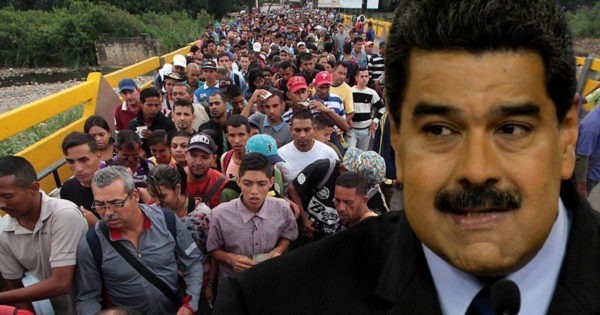
Venezuelan president Nicolas Maduro has quietly admitted defeat in the arena of economics, moving to dismantle the country’s socialist-based economy, replacing it with a hybrid public-private Chinese-style form of capitalism many would call mercantilism or fascism.
Almost a decade after the fiery speeches of Hugo Chavez extolling the superiority of socialism over capitalism, his presidential successor, Nicolas Maduro, is waving the white flag of surrender as his socialist economy lay in ruins.
According to reports coming out of the Latin American nation, Venezuela’s president has quietly begun the transfer of select state assets back to private sector ownership in an effort to reverse Venezuela’s economic collapse and stave off revolution. It is worth noting that this is not a meritocracy, as seen in Western countries during massive economic booms, but instead an example of a formerly socialist country picking the new winners of the economy.
Caracas-based journalists Fabiola Zerpa and Nicolle Yapur reported, “Saddled with hundreds of failed state companies in an economy barreling over a cliff, the Venezuelan government is abandoning socialist doctrine by offloading key enterprises to private investors, offering profit in exchange for a share of revenue or products.”
The assets Maduro’s government seeks to transfer into the public-private economic apparatus includes coffee processors, grain silos, and hotels, all of which were confiscated in the name of the socialist state as part of Hugo Chavez’s widespread nationalization of private assets.
After much pain and suffering, Venezuelan socialist leaders have conceded they cannot effectively run an economy. https://t.co/WHF2e7q4Me
— FEE (@feeonline) February 19, 2021
In the 1950s, Venezuela had the fourth largest economy in the world. It was a prosperous nation with low crime and a higher standard of living than many countries in its region.
But in the 1970s, with the oil crisis, Venezuela’s economic growth began to fail. In a move to upend the declining trend, the Venezuelan government moved to nationalize the oil industry in that country, a move that saw private sector assets from companies like Shell Oil and Standard Oil, seized and made assets of the state.
Venezuela’s dalliance with socialism exploded with the election of self-declared Marxist Hugo Chavez and continued to the bottom of the economic trash heap under Nicolas Maduro where food lines are the norm and simple staples like toilet paper are a rare commodity.
Maduro’s authority over the poverty-stricken nations was so shaken that, according to the United Nations, there was “reasonable grounds to believe that” Maduro’s government had ordered that country’s special forces to kill thousands of political opponents in “extrajudicial executions.”
"In 1950, Venezuela was one of the most prosperous nations in the world. It ranked among the top 10 in GDP per capita and had a labor force with higher productivity than the United States." https://t.co/zAXZqLLJf2 via @feeonline
— Roland Austinat (@austinat) February 17, 2021
Maduro’s move to exploit the benefits of Capitalism harkens back to the capitalization of the USSR and then Russia after the fall of the Soviet Union.
Asdrubal Oliveros, the head of economic consultancy for Ecoanalitica, said, “This process is similar to the privatization process in Russia in that assets are transferred to private local companies and to investors from countries allied to the government.”
Maduro’s initial move was to stop the collection of taxes on select companies, reduce regulations on licensing imports, and persuading Venezuela’s all-important military and other influential officials to “invest” in businesses the state sought to insert into the public-private apparatus.
One Socialist Party lawmaker – who also served as finance minister – Ramon Lobo, said the arrangements have time limits and play off the idea of a concession license. Select companies are allowed to “invest” and manage the asset and the government takes its cut, even as it holds the ability to claw back the company at any time.
“We believe this is positive because it is the synchronization of the public sector with the private sector,” Lobo said. “The state acts as a supervisor and receives compensation.”
In reality, Maduro is attempting to put an oligarchy into place, and one that exploits the benefits of a quasi-capitalist system while controlling the private sector in total.
Maduro’s government continues to employ price controls on food, minimum wage controls, and currency manipulation in an attempt to stabilize the economy, not to mention possessing the power to anoint which private sector entities get to participate in its privatization scheme and who is allowed to “invest” in these public-private ventures.
In the end, Maduro’s new Venezuelan economic system is a hands-semi-off form of fascism that serves a legion of oligarchs.